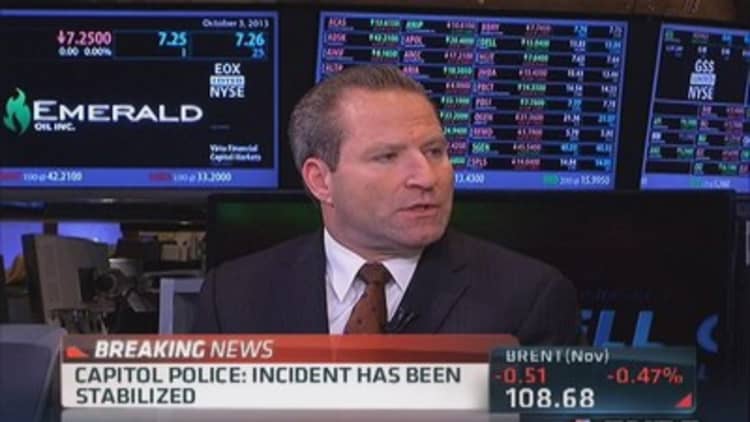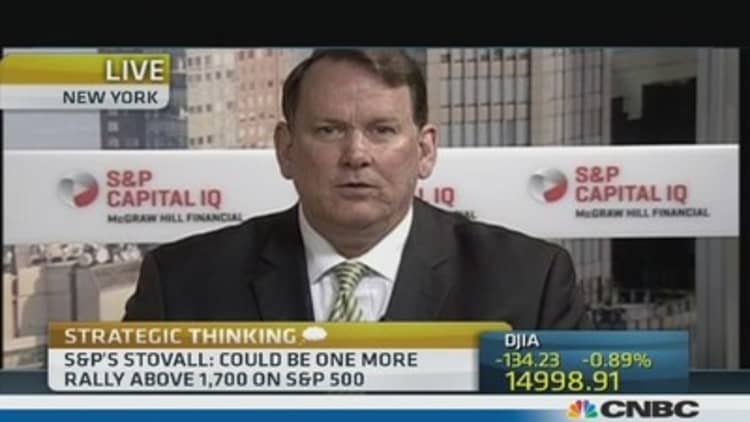Stocks finished broadly lower Thursday, with the Dow closing below the psychologically-important 15000 mark, after gunshots were fired outside the Capitol building and as the government shutdown dragged into a third day.
(Read more: After-hours buzz:Facebook, Pfizer, Lexmark & more)
A female suspect was shot after she initially tried to ram her car into the White House gate, according to sources. She was then was chased by Secret Service for about 12 blocks near the Capitol and exchanged shots with police. The suspect also had a child in the car.
And at least one Capitol Police officer was injured, according to officials.
"At this time, both scenes (White House and Capitol) are secure…we have no information that this incident is related to terrorism or is anything other than an isolated incident," according to a U.S. Capitol police.
The House recessed shortly after indications of gunshots. Pennsylvania Avenue remained closed. The shelter-in-place order for House and Senate personnel was lifted at about 3pm ET after the suspect was shot.
Major U.S. Indexes
The Dow Jones Industrial Average slumped 136.66 points, or 0.90 percent, to close at 14,996.48, dragged by Boeing and Chevron. The blue-chip index finished below 15,000 for the first time since Sept. 6.
The S&P 500 fell 15.21 points, or 0.90 percent, to finish at 1,678.66. And the Nasdaq tumbled 40.68 points, or 1.07 percent, to end at 3,774.34.
The CBOE Volatility Index (VIX), widely considered the best gauge of fear in the market, jumped above 17. The index measures expectations for future stock swings based on the prices investors are willing to pay for options tied to the S&P 500 index. The VIX has surged nearly 15 percent this week.
All key S&P sectors remained in the red, dragged by utilities and industrials.

Stocks spiraled near session lows in midday trading, with the Dow shedding more than 180 points, after President Barack Obama reiterated that he would not meet Republican demands in exchange for operating the government. Late Wednesday, Obama met with Republican and Democratic leaders in Congress in an effort to resolve the budget deadlock.
(Read more: Wall St. wonders if Obama wants 'severe' selloff)
"We went into the government shutdown with the assumption of it being over within the (previous) average of three days—now we're in day 3 and we're not any closer to a resolution than we were on Sunday," said Art Hogan, managing director at Lazard Capital Markets. "As more time goes on and less compromise is on the horizon, the more nervous we'll get…investors are pressing in on the worst-case scenario, which is a Treasury default."
Major equities then pared their losses following a New York Times report that House Speaker John Boehner told colleagues that he is , citing House Republicans.
The Treasury has said the U.S. will exhaust its borrowing limit on Oct. 17. Unless Congress votes to raise the debt ceiling, the U.S. will default on its debt for the first time ever.
"If that occurs, it's likely that Obamacare will be added to the debate on social security and tax reform, among other contentious issues, increasing the already massive stakes of the debt limit discussion," Deutsche Bank's Gael Gunubu wrote in a research note.
(Read more: First a default, then a depression? Some think so)
In a CNBC interview Wednesday, Obama warned Wall Street that this government shutdown could be worse than others. The previous 11 stoppages in the aggregate did little damage to markets, with the S&P 500 using the crises instead as rallying points.
"This time I think Wall Street should be concerned," Obama said. "When you have a situation in which a faction is willing to default on U.S. obligations, then we are in trouble."

On the economic front, government reported that weekly claims increased by just 1,000 last week to a seasonally adjusted 308,000. The latest reading was lower than economist projections for 314,000, despite the government shutdown.
Meanwhile, growth in the service sector cooled in September from August with the Institute of Supply Management non-manufacturing survey index dipping to 54.4. Still, a reading above 50 in the index indicates an expansion in the U.S. service sector.
Factory orders data was not released due the shutdown.
"Thus far this year and despite a clear improvement in the level of initial weekly jobless claims, the pace of hiring has not picked up," wrote Andrew Wilkinson, chief economic strategist at Miller Tabak. "The September (ISM) decline suggests the uncertainty over Washington political gridlock is pinning down the reality of improvements in actual hiring."
(Read more: Buffett speaks outagainst DC's 'extreme idiocy')
Angie's List plunged more than 15 percent following a report from the Wall Street Journal that the online review service was slashing prices in an effort to gain new customers.
BlackBerry declined despite upgrade from Citigroup, which said the troubled smartphone maker's shares had been punished enough. Shares of BlackBerry have tumbled more than 30 percent year-to-date.
And Eli Lilly slumped despite news from the drugmaker that it plans on launching several new drugs this year that target "unmet patient needs."
Bucking the downward trend, Constellation Brands gained after the spirits maker posted a solid earnings report.
In Asia, China's official services purchasing manager's index (PMI) rose to a six-month high in September, lifting hopes the country's growth is picking up.
And in Europe, Italian stocks continued to trade higher following Prime Minister Enrico Letta's triumph in a confidence vote. This followed a dramatic u-turn by rival politician, Silvio Berlusconi, who said he would support Letta, after Berlusconi's party members rebelled against his move to pull down the government.
—By CNBC's JeeYeon Park and Jeff Cox
On Tap This Week:
FRIDAY: Fed's Kocherlakota speaks
What's Trending on CNBC.com:



